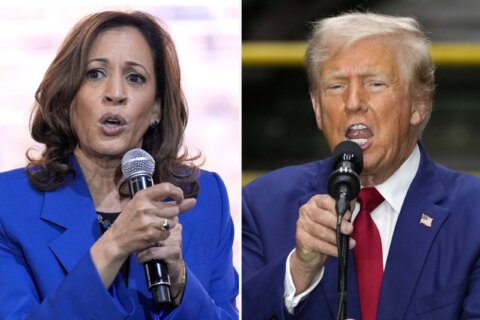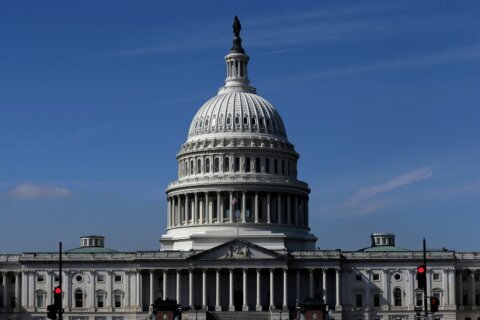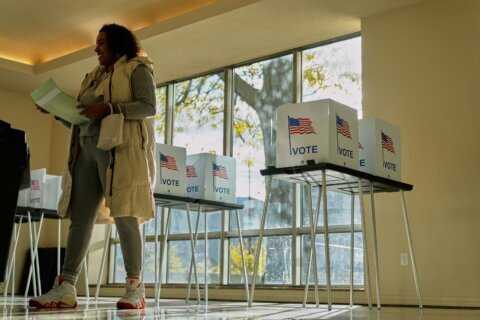Visit WTOP’s Election 2024 page for our comprehensive election year coverage. See the results from the Iowa Republican caucuses here.
The Iowa caucuses on Monday officially kick off the 2024 presidential nominating process, which will likely provide a break from the past.
The Hawkeye State’s voters have always prided themselves on their civic duty and helping to winnow down the top candidates seeking the presidential nomination.
But this race is very different from those in the past, with former President Donald Trump holding double-digit leads in every poll, while Florida Gov. Ron DeSantis and former South Carolina Gov. Nikki Haley try to provide an alternative for GOP voters.
A new Iowa poll from the Des Moines Register/NBC News Mediacom shows that Trump has the support of 48% of likely voters, followed by Haley, with 20%.
DeSantis sought to carry out what’s called the “Full Grassley,” a reference to visiting all of the state’s 99 counties, which longtime U.S. Sen. Charles Grassley, R-IA, has repeatedly done in his decades in office.
Despite pouring lots of resources into Iowa, polls have shown him trailing the former president. A poll released late last week also showed Haley, for the first time, leading DeSantis in Iowa, as well.
DeSantis arguably has the most to gain — and lose — in the Iowa caucuses.
Haley has done stronger in polls in New Hampshire than Iowa, but her campaign has been gaining momentum in recent weeks.
Both GOP challengers have been reticent to strongly criticize Trump, since they don’t want to alienate his supporters.
That’s in stark contrast to former New Jersey Gov. Chris Christie, who made a point of repeatedly criticizing the former president before dropping his presidential campaign last week.
What to watch for — and what role could the weather play
Iowa has undergone considerable change in recent years.
While Barack Obama won the state by six percentage points in 2008, Donald Trump won it by eight percentage points in 2020. That’s the largest swing to the GOP of any state in the country.
DeSantis and Haley are likeliest to do well against Trump in Johnson County, the home of the University of Iowa.
Sabato’s Crystal Ball also points to a key test area for DeSantis — northwest Iowa, which is an evangelical stronghold.
Iowa’s chilly, snowy weather is also going to continue to get a lot of attention.
Monday’s weather is likely to make this day of the caucuses one of the coldest in close to 50 years.
The cold weather could keep voters home, dropping turnout.
Analysts point out the weather could keep many older voters from turning out. Also, the snow could disproportionately affect more rural areas.
Overall, a lot of attention will focus on Trump and whether he wins as big as polls have suggested. And the caucuses will of course provide the first real indication of where Haley and DeSantis stand with voters.
A poor performance by DeSantis could put pressure on him to drop out of the race, while a solid showing could keep the what’s now effectively a three-candidate contest going forward to the Jan. 23 New Hampshire primary.
Iowa — not a good predictor of the nominee
While Iowa’s caucuses have received outsized attention in presidential races going back to the 1970s, the state’s voters don’t have a great track record of choosing the ultimate party nominees.
This year, its influence on the presidential campaign may be even more diminished, given former President Donald Trump’s dominance in the polls.
Still, it will provide a snapshot of what voters think of DeSantis and Haley, his two most prominent remaining rivals for the Republican nomination.
The last Republican to win Iowa in a contested year and go on to get elected to the White House was George W. Bush, in 2000.
Otherwise, the state has a checkered track record of choosing the ultimate nominees.
U.S. Sen. Ted Cruz, R-TX, won Iowa in 2016 over Trump, who didn’t debate in the state — something he didn’t do this year, either.
President Biden did poorly in 2020 in the Democratic caucuses, finishing fourth. But he managed to gain traction later on, most significantly winning the South Carolina primary, that helped propel him to the Democratic nomination.
Since 1976, only two Democrats have won contested Iowa caucuses and gone on to the White House — Barack Obama in 2008 and Jimmy Carter in 1976.
Why are the Democratic caucuses different this year?
While Democrats don’t have a contested race for their presidential nominee, the party has implemented several changes in the Iowa caucuses.
The changes are due to the disastrous Democratic caucuses in 2020, when there were numerous problems with counting and communication. The results weren’t known for weeks after the caucuses ended and the state’s Democratic Party chair resigned.
In fact, the race between Bernie Sanders and Pete Buttigieg was so close, The Associated Press ultimately declined to declare a winner.
Democrats this year are still holding their caucuses today. But those who attend the caucuses will not vote or indicate who they will pick to represent the party on the November ballot. They will vote for a party nominee in a mail-in voting process that began Jan. 12 and will end on March 5.
Get breaking news and daily headlines delivered to your email inbox by signing up here.
© 2024 WTOP. All Rights Reserved. This website is not intended for users located within the European Economic Area.








